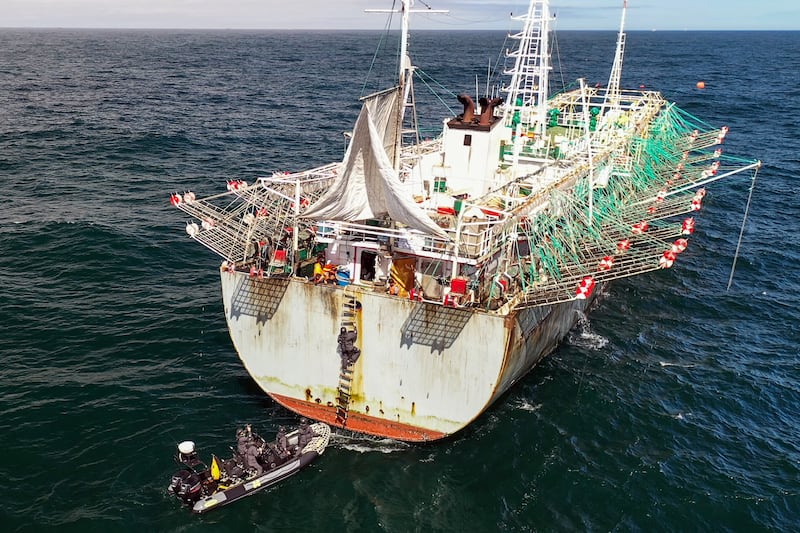A documentary crew investigating claims of human rights abuses against Chinese fishing fleet workers have claimed the products they catch are ending up in Irish supermarkets.
The Outlaw Ocean Project, headed by former New York Time investigative reporter Ian Urbina, has said brands such as Tesco, Lidl and Aldi have carried seafood products that originate from vessels and processing plants where abuses include deaths from violence, debt bondage, withheld wages, excessive working hours, beatings of deckhands, passport confiscation and restricting medical care.
Read More
- 'If I told the captain I was taking crew members with me, I wouldn’t make it off the ship alive'
- How a four year investigation linking fish sold in Irish supermarkets to human rights abuses at sea was conducted
As part of the four-year project, the team have boarded fishing vessels around the world where workers have often pleaded with them to be rescued, or at least tell their family members they are alive.
At other times, when they could not access ships, the team took the novel approach of pursuing vessels on a speed boat and throwing plastic bottles containing questionnaires on board.
Tracking a complex supply chain from fishing vessels to Irish supermarkets, the investigation alleges that at least two European white fish importers import pollock and cod from Chinese processors using Uyghur forced labour.
The imports then supply Nomad Foods, “a giant of European seafood” with a turnover of $3bn in 2022.
With territories including Ireland, the UK, Italy, Germany, France and Sweden, Nomad Foods owns several household brands such as Bird’s Eye, Findus and Iglo.

The first of Nomad’s European importers, Unibond Seafood International, is alleged to buy cod and pollock from Qingdao Tianyuan – a Chinese processing plant said to have used Uyghur forced labour since 2018 and as recently as April 2023.
The second importer, NorthSeafood Holland, is said to have imported shipments of fish from suppliers called Yantai Sanko Fisheries and Yantai Longwin Foods – both alleged to have received Uyghur labourers under a Chinese state-imposed programme since 2019 and to at least 2023.
Nomad Foods have since told the Irish News they deny having received any supply from Yantai Sanko Fisheries via Northseafood Holland or any other trading partner.
Detailing the links to supermarkets, it is claimed that Aldi’s own-brand catch in the UK market, under the Tasty Catch and Fishmonger brands, can be linked to vessels with a history of rights abuses.
It is claimed these vessels supply a large seafood processor in China’s Shandong province (Rongcheng Pucen Aquatic Foods.)
Lidl’s own brand of squid, sold under the Eridanous range, is sold at stores across Europe including Ireland.

It is alleged the squid is processed by another firm (Zhoushan Xifeng Aquatic) that is supplied by companies whose vessels have a history of fishing offences including illegal fishing and shark finning.
The Outlaw Ocean Project goes on to state that at least one Irish importer – Pan Euro Foods - is using a processor that employs Uyghur labour.
The frozen food distributor supplies products like Diggers fish gouons across Ireland to retailers including Tesco.

It is alleged the pollock goujons are processed at Rizhao Jia Tian Xia, a subsidiary of the Shandong Meijia Group.
In 2019, the documentary team say that over 100 people from the Xinjiang region in China were transferred to work at facilities owned by the Meijia Group through a “poverty alleviation” scheme, said to be a common euphemism for a forced labour programme.
In February 2020, a group of 39 workers were also said to be transferred to Shandong from Xinjiang to resume working at Meijia Group.
Responding to the Outlaw Ocean Project, Lidl said it was investigating the allegation, while the Zhoushan Xifeng company said the raw squid sourced was approved and certified.
Northseafood Holland’s sales manager Pieter Post, the importer accused of using two workshops with forced labour, told the Outlaw Ocean Project: "We have stopped the cooperation with this workshop many years ago, no further comments."
The company did not respond to requests to clarify which of the two workshops they meant.
The Irish News independently contacted Tesco, Aldi and Lidl for a response on the claims as well as Nomad Foods, Unibond Seafood International and Pan Euro Foods.
Replying on behalf of Tesco, a spokesperson for the British Retail Consortium said: “Protecting the welfare of people and communities in supply chains is fundamental to our members' sourcing practices. Forced labour has no place in our retailers supply chains, and any practices that fall short of our high standards will not be tolerated.”
A spokesperson for ALDI Ireland said:
“We have a rigorous process in place working with international authorities to guarantee our fish has been caught legally and is fully traceable. The exploitation of vulnerable workers has no place in our business or supply chain and any breaches to our strict policies will be investigated.”
A spokesperson for Unibond Seafood International said they were "very surprised" by the allegations of forced labor in the Qiingdao Tianyuan processing plant, which only accounted for "a negligible part in our supply base".
Stating that all product was sourced with the "full knowledge and approval of customers," they said third party audits were completed in line with supply chain practices and requirements.
Stating the company was committed to exclusively sourcing products from "thoroughly vetted" suppliers, they added that Unibond had an "unwavering dedication to ethical and responsible supply chain practices".








